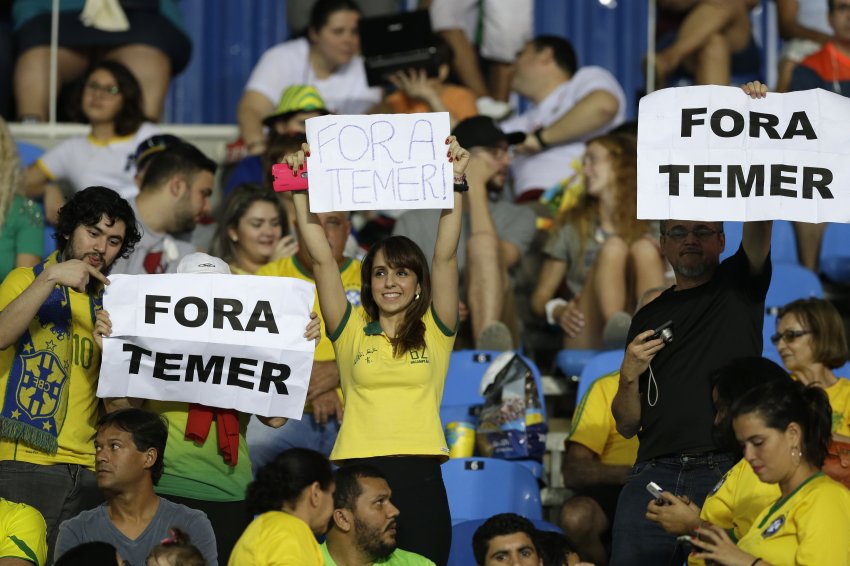
Jorge Knijnik is a researcher at the Institute for Culture and Society at the University of Western Sydney, and specialist in sport and social justice issues.
He spoke to Lalitha Chelliah from the Solidarity Breakfast Show on Melbourne community radio station 3CR on August 6 about the many social issues swirling around the 2016 Rio Olympics. Below is an edited and abridged transcript.
* * *
Last December, you wrote about the “10 Commandments” of the 2016 Rio Olympics. Can you tell us about these?
Well at that time, Brazil had a different president, [the Workers' Party's] Dilma Rousseff, who is now facing an impeachment process that looks more like a soft coup d'etat.
But at the time, her government was [seeking to make the Olympics] a very important social legacy event. That is what the “10 Commandments” are about.
Something like that was unachievable, because the Olympics are dominated by all these international corporate forces, which block any social and educational progress. So the “10 Commandments” and the legacy are more a fantasy than a reality.
It is unachievable because the big forces involved don't allow social progress. Like, leaving a legacy for the entire population of the city is a worthwhile goal for the Games, but in fact the legacy is just for the wealthy part of the city.
All the reforms and the redesigns of the city are in one of the wealthiest parts of the city, which is Barra da Tijuca. It is like if in Sydney, you do good things for Bondi, which is already very wealthy, instead of improving Blacktown or parts of Western Sydney where improvements are much more needed, such as public transport and services.
You also wrote about what you called the Rio state government's pacification of the favelas (poor neighbourhoods). Can you talk a little about this?
The pacification of the favelas is a program that has been ongoing since Rio was announced as host of the Olympics. At the end of the day, it means the militarisation of the favelas, because the military police go there and keep taking rights away from the favela citizens.
It is meant to mean taking on the drug gangs, replacing the drugs violence first by the police and second by public services like education and health services. But these services are yet to come and, at the moment, the favelas are under martial law because of the Olympics. Not only the military police, but the army is there as well, and it's very tough for the citizens.
Moreover, with this militarisation comes the criminalisation of any social movement or political protest. I was just talking to someone in Brazil and they said at the opening ceremony, everywhere people are protesting against the interim president Michel Temer.
They are saying “Fora Temer” (“Temer out”). Temer is the interim president who is leading this coup against Dilma, the elected president. The authorities ordered anyone who says “Fora Temer” during the opening ceremony to be thrown in jail. I think there will be no space in any jail because everybody is saying that.
The main broadcaster is involved in the coup as well. They don't show these images, but it's everywhere on social media.
Even at the first matches of the football competition, a lot of people had jerseys and banners saying “Fora Temer”. The police approach them and ask them to leave or just throw their banners away.
So it's a very interesting situation, with all of this criminalisation. I think the budget for security is just huge, they purchased all sorts of security equipment, all [justified with] fear of terrorism. But behind it all there has been the criminalising of the social movements.
Here we have what is called an international competition, but they don't look at the fact that Third World countries don't have the resources to compete against First World nations, who pour millions into training their athletes. Yet there is pumped up excitement about the very rich nations and very rich peoples having fun at the expense of poor people locally and internationally. What do you think of that?
Unfortunately, that is what it's all about in elite sport, at the end of the day.
For instance, the Olympic committee, the games organisers, are distributing half a million condoms in the Olympic village. As we know, everywhere where there are young people, music and dance festivals, they will have sex and that's fine with me, no problem. But I don't know why we have to pay for it. So it's a big party, with public resources involved and with thousands of people dislocated so the party can go on.
Of course, it's a huge tragedy against human rights and also it's a paradox because the Olympic charter talks about human dignity. But at the end of the day, they are against human dignity because they curb all these human rights.
What's your thinking about the legacy that will be left in relation to the games?
It's very controversial. Legacies are much more than just the economic part: there is a cultural, a social, a historical legacy. So there will be an ongoing investigation so our cultural and historical legacies cannot be denied.
But, for the coming days, months and years it will be very tough for the population because, just before the Games, the state of Rio de Janeiro declared bankruptcy. They said they were bankrupt and couldn't pay anything for the Games, so because of the declaration of an emergency, they could borrow more money from the federal government.
So they are not paying for essential public services, they are postponing public sector wages. It will be very tough. They are already facing a huge economic crisis and this will be ongoing until something happens in terms of payments, but it will be very hard for the unprivileged people in Rio.